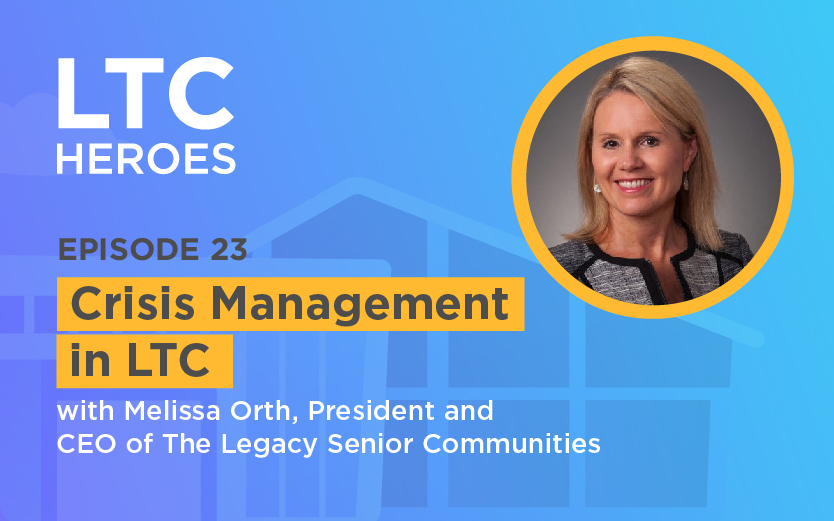The Learning Curve as a New LTC Leader
On this episode of the LTC Heroes podcast, Melissa Orth, President and CEO of The Legacy Senior Communities, sits down with us to discuss her journey into LTC and how her organization took the recent Texas power outage in stride.
Melissa talks about her experience of transitioning from education to LTC, noting the skills she was able to reapply and the new knowledge she had to learn around regulations and requirements.
She discusses the learning curve around marketing in LTC, highlighting all the different parties and constituents that need to be targeted in this industry. Melissa also describes the challenges of having to go from high-touch marketing tactics to virtual marketing amidst the pandemic.
Managing the Texas Power Outage Crisis
Melissa opens up about her experience of leading The Legacy Senior Communities through the Texas power outage, noting the crucial role that clear communication and problem solving played in their success. She says one of the keys to handling a crisis like this one is decisiveness from leadership. When there’s a clear plan of action, it’s much easier to collaborate with other teams and keep everyone working toward the same goal.
She also points out that when there isn’t a formal handbook around handling these types of issues, leaders need to be able to follow their intuition and make sense of whatever data is available.
Learn more and sign up to be notified about future episodes at LTCHeroes.com
Rapid Fire Q/A
Who is one mentor who has influenced the way that you do care in our industry?
I think the one that guided me genetically and by her actions was my grandmother on my dad’s side. I started in public accounting and dealt with a lot of different clients, but had some of the larger nonprofits in the Dallas area that were clients of the firm I worked for. And I immediately realized that that’s really where my passion was. And you know, my grandmother was a teacher and a principal well before the time when women rose to those levels of leadership. She just always modeled by what she did within our community, both professionally and from a volunteer perspective, about how important it was to give back.
What is one lesser-known resource, book, or newsletter that you go to when you want to be up to date on LTC info?
Right now we are working with a system called “EOS” (the entrepreneurial operating system), to make sure that the objectives, culture, and values that we’ve set through our strategic planning are working in an integrative and collaborative way.
There’s a book that goes along with it that I’ve yet to read called “Traction”. There’s also some reference to “Good to Great” and having the right people in the right seats. And also I know that’s not necessarily unique, but I think it is really important that you don’t work in silos, and that the organizational values, mission and vision are consistent across all of your operating entities.
What advice would you give to your younger self, as you started to move into leadership positions, knowing what you know, today?
I think that you have to just trust your gut when you decide to switch industries or switch companies, and make sure that you’re growing with each position. Know that collective knowledge and experience will then naturally take you to the next level of your career.
You spend so much time with the people that you work with and the people you serve. It’s got to be something that you get up and look forward to every day, even the tough days. And if it’s not, there are too many other opportunities out there. And you should keep looking until you find something that you really feel passionate about.
Resources:

